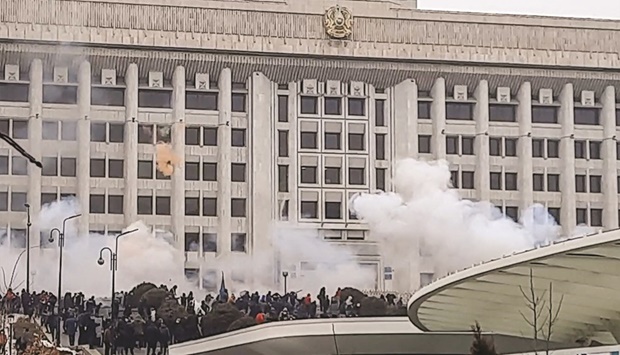Protests around Kazakhstan have killed eight security personnel and injured 317, a news agency said yesterday, as President Kassym-Jomart Tokayev failed to quell public outrage over the influence of his powerful predecessor.
Initially angered by a New Year’s Day fuel price rise, protesters have stormed and torched state buildings and chanted against Nursultan Nazarbayev, who kept wide authority despite stepping down as president in 2019 after nearly three decades.
Tokayev sacked him as head of the National Security Council yesterday while his cabinet also resigned.
Russia’s state-owned Sputnik news agency quoted the Kazakh interior ministry as saying the police and national guard troops were killed and injured in several regions on Tuesday and yesterday during Kazakhstan’s worst unrest in over a decade.
Kazakhstan’s reputation for stability under Nazarbayev helped attract hundreds of billions of dollars of foreign investment in its oil and metals industries. But political analysts said a younger generation was demanding the liberalisation seen in other former Soviet states.
The protesters seized control of the airport in Almaty, Kazakhstan’s biggest city, a source familiar with the matter told Reuters. All flights to and from Almaty were cancelled.
A witness told Reuters he could see protesters removing benches along Almaty’s main Astana square to build barricades. Earlier, riot police used tear gas and flash grenades against the protesters but then appeared to abandon some streets in Almaty.
Both the United States and Russia appealed for calm.
Nazarbayev’s hand-chosen successor as president, Tokayev said in a national address that he had taken over as head of the State Security Committee, a post that had been retained by Nazarbayev.
The 81-year-old former president has still been widely seen as the main political force in Nur-Sultan, the purpose-built capital which bears his name. His family is believed to control much of the Kazakh economy, the largest in Central Asia.
In his TV address, Tokayev did not mention his predecessor by name. Nazarbayev has not been seen or heard from since the protests began.
Tokayev also removed Nazarbayev’s nephew as No 2 at the State Security Committee, successor to the Soviet-era KGB.
A resident of Almaty who mingled with the protesters yesterday said most of those he met appeared to come from the city’s impoverished outskirts or nearby villages and towns.
At the main square, some people were discussing whether to head towards the city bazaar or a wealthy residential area for possible looting, the resident said.
“There is complete anarchy in the street. Police are nowhere to be seen,” he said.
Footage posted on the Internet showed protesters chanting below a giant bronze statue of Nazarbayev, strung with ropes in an apparent attempt to pull it down. A woman who posted it to Twitter said it was filmed in the eastern city of Taldykorgan.
Earlier, an Instagram live stream by a Kazakh blogger had shown a fire blazing in the office of the Almaty mayor, with apparent gunshots audible. Videos posted online also showed the nearby prosecutor’s office burning.
Early yesterday, Reuters journalists had seen thousands of protesters pressing towards Almaty city centre, some of them on a large truck. The city’s police chief said Almaty was under attack by “extremists and radicals”.
States of emergency were declared in Nur-Sultan, Almaty, and westerly Mangistau province. The Internet was shut down in what monitoring site Netblocks called “a nation-scale internet blackout”.
After accepting the cabinet’s resignation, Tokayev ordered acting ministers to reverse the fuel price rise, which doubled the cost of liquefied petroleum gas from the start of the year. The gas is widely used to power vehicles in Kazakhstan where official prices had made it much cheaper than gasoline.
The unrest saw the price of Kazakhstan’s dollar bonds plunge by nearly 6 cents, the worst showing since the height of the market collapse of 2020 after the start of the Covid-19 pandemic. The unrest was the worst in Kazakhstan at least since 2011, when at least 14 protesters were killed by police during a strike by oil workers in the western city of Zhanaozen.
“I think there is an underlying undercurrent of frustrations in Kazakhstan over the lack of democracy,” said Tim Ash, emerging market strategist at BlueBay Asset Management.
“Young, internet-savvy Kazakhs, especially in Almaty, likely want similar freedoms as Ukrainians, Georgians, Moldovans, Kyrgyz and Armenians, who have also vented their frustrations over the years with authoritarian regimes.”
The Kremlin said it expected Kazakhstan, a close ally of Russia, to quickly resolve its internal problems, warning other countries against interfering.
Expressing concern over the situation, White House press secretary Jen Psaki said Russian accusations that the United States had instigated the unrest were “absolutely false”.
Kazakhstan has been grappling with rising price pressures. Inflation was closing in on 9% year-on-year late last year — its highest in more than five years — forcing the central bank to raise interest rates to 9.75%.

Image grab shows protesters near an administrative building during a rally over a hike in energy prices in Almaty yesterday.
